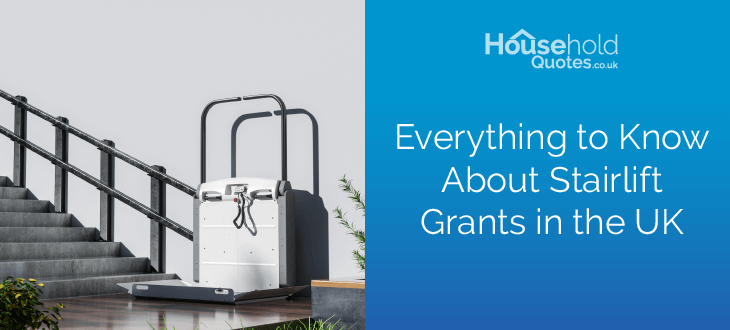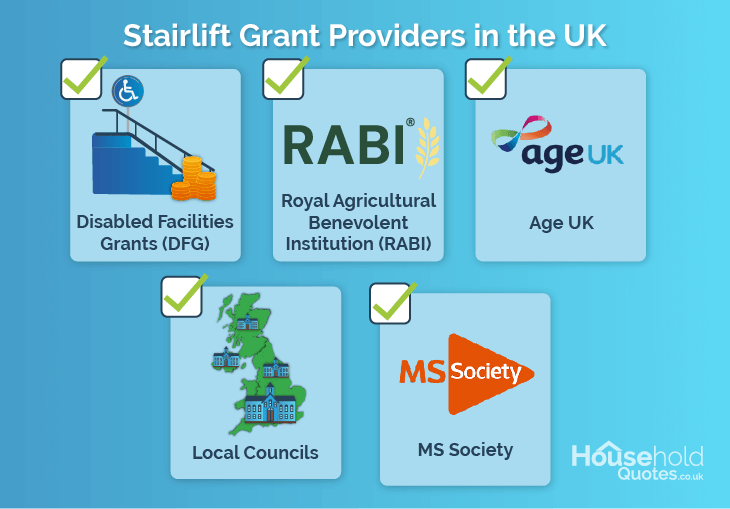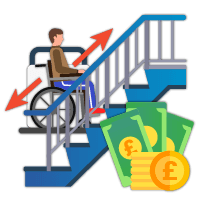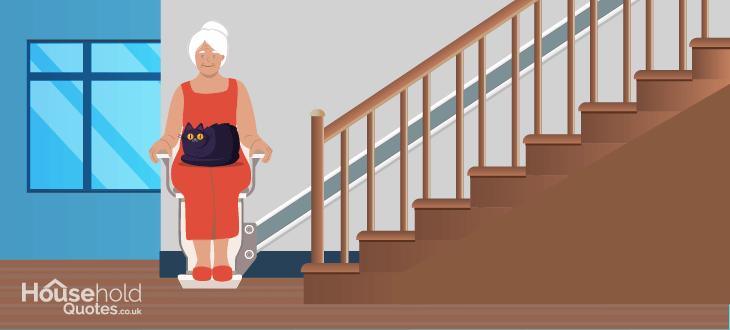
Tell us what you need to find a matching loft conversion specialist

Get free quotes from professionals near you

Compare offers and choose the one that best matches your need
- Householdquotes.co.uk
- Stairlifts
- Stairlift Grants
Your Comprehensive Guide about Stairlift Grants in the UK


- Stairlift grants are accessible through a variety of channels. From schemes like the Disabled Facilities Grant (DFG) to assistance provided by associations such as Age UK and the MS Society, there exists a plethora of avenues for individuals to pursue.
- Alternatively, individuals can explore diverse financing options, including renting a stairlift, availing payment plans, lease agreements, or considering reconditioned stairlifts, which present a compelling and economical choice.
- The DFG scheme can encompass expenses for essential home adaptations, including the installation of stairlifts, with funding limits reaching £30,000 in England, £36,000 in Wales, and £25,000 in Northern Ireland.
Stairlift grants in the UK are financial aids provided to individuals who need assistance with mobility in their homes due to age, disability, or health conditions. These grants are designed to cover part or all of the stairlift costs including purchasing and installing. This can significantly improve the quality of life for those who struggle with stairs. They ensure that individuals can continue living safely and independently in their own homes.
Looking for stairlift quotes? Just complete our short 30-second form, and you'll promptly receive up to 3 FREE QUOTES from stairlift companies and installation experts in your area. This service is entirely free of charge and devoid of any obligations. Click the button below to get started!
- Describe your needs
- Get free quotes
- Choose the best offer
It only takes 30 seconds

- Stairlift grants
- Who can qualify for a stairlift grant?
- Who are the providers for stairlift grants?
- How to apply for a stairlift grant
- Are there free stairlifts for pensioners?
- Is it possible to get a free stairlift on the NHS?
- How can you get stairlift from social services?
- What can you do alternatively if you don't qualify for a stairlift grant?
- FAQ
Stairlift grants
Stairlift grants are subsidies or financial assistance schemes aimed at helping individuals afford the necessary modifications to their homes, such as the installation of stairlifts. These grants can cover various costs, including purchasing the equipment, installation, and sometimes maintenance.
Sources of stairlift grants

Government programs like Disabled Facilities Grant (DFG)
This is the main source of government assistance for home adaptations in the UK. The DFG is available in England, Wales and Northern Ireland, and it can help pay for the costs of installing a stairlift. To qualify, the applicant must prove that the stairlift is a necessary adaptation to live comfortably and safely in their home. The grant process involves an assessment by an occupational therapist and the amount awarded depends on the household income and savings.
Local authorities
Some local councils offer additional grants or have specific funds allocated for residents' home adaptations. These can complement or serve as an alternative to the DFG, depending on the local council's resources and criteria.
Charities and non-profit organisations
Various charities and non-profit organisations also offer grants or subsidised programs for individuals in need of stairlifts. These include Age UK, MS Society, and others specific to certain disabilities or conditions. These organisations sometimes work through partnerships with stairlift fitters and manufacturers to provide discounted or free installations.
Other funding sources
Private health insurance and local community funds might also provide assistance or referrals to funding sources for stairlifts.
Things to consider
- Eligibility: Eligibility criteria can vary, so it's important to check the specific requirements set by the funding body.
- Waiting times: The process can be lengthy, particularly if demand is high or the case is complex.
- Maintenance costs: Consider future maintenance costs of the stairlift, as not all grants cover ongoing maintenance.
Are the stairlift grants available now?

Stairlift grants in the UK are generally available, but their accessibility can vary significantly depending on several factors such as location, eligibility criteria, funding availability, and specific times of the year. Here’s a detailed look into the current state of stairlift grant availability:
Availability by location
The provision of stairlift grants can vary by region:
- Disabled Facilities Grant (DFG): England, Wales, and Northern Ireland each have their own versions of the DFG. The availability and specific conditions of these grants can differ, reflecting regional governance.
- Local councils: Within each country, individual councils may have different levels of funding available and may also offer additional local grants or assistance programs beyond the DFG. It's important to check with your local council for the most accurate and up-to-date information.
Eligibility criteria
Eligibility for stairlift grants often depends on the applicant's physical needs, financial situation, and other personal circumstances:
- Health assessment: An assessment by an occupational therapist is usually required to establish the need for a stairlift as a necessary home adaptation.
- Financial assessment: These are also part of the application process, as many grants are means-tested based on the applicant’s income and savings.
Funding availability
The amount of funding available can influence the accessibility of stairlift grants:
- Budget constraints: Sometimes, the funding for grants like the DFG is limited and can be exhausted before the end of the financial year, which may affect when applications are accepted or processed.
- Renewal of funds: Funding is typically allocated on an annual basis, and new funds are generally made available at the start of the financial year. You may find more success or shorter waiting times if you apply shortly after new funding is released.
Application process
The application process for stairlift grants may not have strict deadlines but is subject to the availability of funds:
- Ongoing applications: For programs like the DFG, applications can usually be submitted at any time throughout the year. However, processing times and the success of applications can vary based on the current demand and funding status.
- Set application periods: Some local grants or charity-funded programs might operate within specific application windows. These are often dictated by the funding cycles of the providing organisation.
Being proactive and informed about the process and timing can significantly enhance the chances of receiving a grant.
Who can qualify for a stairlift grant?

In the UK, qualifying for a stairlift grant involves meeting specific criteria that generally focus on the individual's physical needs, financial situation, and residency status. The purpose of these grants is to help individuals with mobility issues remain independent in their homes by providing financial assistance for home adaptations like various stairlifts. Here’s a detailed look at the common criteria:
Medical or mobility needs
- Assessment of need: Applicants must typically demonstrate a genuine need for a stairlift due to mobility issues or a disability that makes using stairs challenging. This need is usually confirmed through an assessment conducted by an occupational therapist or a healthcare professional.
- Long-term benefit: The stairlift must be expected to provide a significant long-term benefit, enhancing the applicant's ability to live independently.
Financial eligibility
- Means testing: Many stairlift grants, such as the Disabled Facilities Grant (DFG), involve a means test which assesses the applicant's financial resources. The amount of grant offered can depend on the applicant's income and savings. Low-income households are more likely to receive full funding, whereas those with higher incomes may need to contribute towards the cost.
- Home ownership and residency: Applicants usually need to be homeowners or tenants with a long-term lease. Proof of residency and permission from the landlord (if renting) are typically required.
Residential criteria
- Permanent UK resident: Applicants should be permanent residents in the UK and be applying for a grant in the area where they live.
- Suitability of home: The home must be deemed suitable for a stairlift installation. This includes having the structural capacity to support the stairlift and that the stairlift will fit within the home's existing layout.
Specific grants criteria
- Age and specific conditions: Some organisations offer grants targeting specific groups, such as the elderly, veterans, or individuals with conditions like MS or severe arthritis. These grants might have additional criteria based on the individual's age or medical condition.
- Personal Independence Payment (PIP): PIP is a welfare benefit in the UK designed to help people with the extra costs of living with a long-term health condition or disability. While PIP itself is not a grant, it can enable individuals to access other forms of financial assistance and support like Disabled Facilities Grant (DFG), Mobility schemes, Access to Work scheme, Blue Badge scheme, council tax reduction and Warm Home Discount scheme.
Other considerations
- Local council variations: Criteria can vary slightly between different local councils, as each council may have specific regulations and budgets.
- Future housing plans: Applicants usually need to intend to reside in their current home for a significant period after the stairlift is installed, ensuring the investment is justified.
For anyone considering applying for a stairlift grant in the UK, the first step should be to contact their local council or a relevant charity. They can provide guidance, help with the application process, and inform you about the specific criteria and documentation required for your particular situation.
Who are the providers for stairlift grants?

In the UK, several organisations and government bodies offer stairlift grants to help those with mobility issues improve access within their homes. These grants can significantly aid individuals in maintaining their independence and safety. Below is an overview of the main providers of stairlift grants:
Disabled Facilities Grants (DFG)
- Eligibility: Individuals with a disability or health condition that makes accessing different levels of their home challenging are eligible. An assessment by a local authority occupational therapist is usually required to determine need.
- Benefits: Grants can cover the costs for necessary home adaptations, including stairlifts. This goes up to £30,000 in England, up to £36,000 in Wales and up to £25,000 in Northern Ireland. DFGs are not available in Scotland, but similar support may be obtained through local area health and social care partnerships. The grant amount depends on the applicant's financial situation, and applicants may need to pay a portion of the cost depending on their means.
Royal Agricultural Benevolent Institution (RABI)
- Eligibility: This grant is specifically for individuals who are working in or retired from the agricultural sector, including farmers and farm workers, and their dependents.
- Benefits: Assistance can vary but generally includes financial support for home adaptations like stairlifts across the UK, ensuring those who have spent their lives in agriculture can continue living independently. RABI also offers comprehensive support, including welfare advice and mental health counselling, in addition to financial aid.
Age UK
- Eligibility: They focus on supporting older adults, typically those over the age of 60, across the UK.
- Benefits: They can provide grants or aid in finding funding for home adaptations such as stairlifts to ensure the elderly can continue to live comfortably in their own homes. Age UK also offers advice and support on a range of issues affecting older adults, including health, finance, and social care.
MS Society
- Eligibility: Specifically for individuals diagnosed with multiple sclerosis (MS) or their carers, across the UK.
- Benefits: They provide grants for equipment and home modifications that improve quality of life, including the installation of stairlifts. Besides financial aid, the MS Society also offers information, support, and education to those affected by MS.
Local councils
- Eligibility: Residents who need modifications to their homes due to disability or mobility issues can apply. Each council has its own criteria, but generally, an assessment is required to establish the necessity of adaptations.
- Benefits: Grants or funding provisions are typically similar to those offered by the DFGs, but local councils may have additional resources or programs specific to the needs of their community. In England, Wales and Northern Ireland, it follows the DFG guidelines. Scotland offers various home adaptation grants depending on local council policies. Application processes may vary significantly between different councils; contacting your local council directly will provide the most accurate and relevant information.
How to apply for a stairlift grant
Assessment: Contact your local council to apply for a Disabled Facilities Grant (DFG). The process begins with an assessment of your needs typically conducted by an occupational therapist.
Application: Complete an application form detailing your financial situation and the necessary home adaptations. This form is available from your local council.
Quote: Obtain quotes from stairlift suppliers. Some councils require one or more quotes to process your grant application.
Approval: Wait for the grant to be approved. Approval times can vary depending on the local authority's backlog and the complexity of your application.
Installation: Once approved, the stairlift can be installed. The grant usually pays the supplier directly.
These organisations and grants represent a vital resource for those in need of stairlifts and other home adaptations, each offering tailored solutions to assist individuals in maintaining independence in their living environments.
Are there free stairlifts for pensioners?

In the UK, the government does not directly provide free stairlifts to pensioners. However, there are several avenues through which seniors can access financial assistance to help cover the costs of installing a stairlift, making them more affordable and sometimes effectively free.
These include: Disabled Facilities Grants (DFG), charities and non-profit organisations, local council support, different financing options like payment plans and lease agreements or opting for reconditioned stairlifts, which are a great cost-effective option.
While free stairlifts are not typically available directly from the government for pensioners, these alternative routes provide various forms of financial assistance and payment options, making stairlifts accessible and affordable for those on a fixed income. It's advisable for pensioners to explore multiple options and seek advice from local councils and charitable organisations to determine the best financial solution for their needs.
Is it possible to get a free stairlift on the NHS?
No, it is not possible to get a free stairlift directly from the NHS. The NHS typically does not cover home modifications like stairlifts as they are considered to be the responsibility of local authorities or personal funding. However, the NHS can help in other ways, such as providing assessments and recommending modifications to your home to help manage disabilities or mobility issues. This can be useful when applying for grants or other forms of financial assistance.
For those looking to acquire a stairlift, there are several avenues to explore. We have mentioned it in detail in this guide. These options provide a range of alternatives for those who need a stairlift but are unable to obtain one through the NHS.
How can you get stairlift from social services?

To obtain a stairlift from social services or your local council, the first step is to contact them directly and express your need for a stairlift. You can request an assessment to determine your eligibility for financial assistance or a grant to cover the cost of the stairlift installation. Social services will typically conduct an assessment to evaluate your mobility needs and assess whether a stairlift is necessary to improve your quality of life and independence at home.
Once your need for a stairlift has been established, you can apply for financial assistance through schemes such as the Disabled Facilities Grant (DFG). The DFG is a government-funded grant available in England, Wales, and Northern Ireland, which provides financial assistance to eligible individuals to make essential adaptations to their homes, including the installation of stairlifts. In Scotland, similar support may be available through local area health and social care partnerships.
To apply for a DFG or similar grant, you will need to submit an application to your local council, along with supporting documentation such as medical assessments and proof of income. The council will then assess your application and determine the level of financial assistance you are eligible to receive based on your individual circumstances.
Are you considering acquiring a stairlift through social services?
In the UK, people with disabilities might be eligible for aid through the Disabled Facilities Grant (DFG). This grant, which is assessed based on financial need, supports home modifications, including the installation of stairlifts, for individuals requiring assistance. To initiate the application process for the DFG, reach out to your local council or consult the Gov.uk website for comprehensive details and guidance.
It's important to note that the availability and criteria for stairlift grants may vary depending on your location and local council policies. Therefore, it's recommended to contact your local council or social services department directly for specific guidance and information on how to apply for a stairlift grant in your area.
What can you do alternatively if you don't qualify for a stairlift grant?
If you find that you don't qualify for a stairlift grant, there are still several alternative options available to make acquiring a stairlift more affordable. Here are a few options you can consider:
Renting a stairlift
Renting a stairlift can be a cost-effective solution, especially if you only need it for a short period. Renting typically involves a monthly fee, which can be more manageable than the upfront cost of purchasing a stairlift outright.

Reconditioned stairlifts
Consider purchasing a reconditioned stairlift instead of a brand new one. Reconditioned stairlifts are pre-owned units that have been refurbished and serviced to meet safety standards. They are often significantly cheaper than new stairlifts and can provide a more budget-friendly option.
Financing plans or instalment payments
Many stairlift suppliers offer financing plans or instalment payment options that allow you to spread the cost of purchasing a stairlift over time. This can make buying a stairlift more affordable by breaking down the cost into manageable monthly payments.
Budgeting and saving money
Consider budgeting and saving money specifically for the purchase of a stairlift. Set aside a portion of your income each month until you have enough to cover the cost of the stairlift. Cutting back on non-essential expenses and prioritising your savings goal can help you reach your target more quickly.
Getting multiple quotes
Shop around and obtain quotes from multiple stairlift suppliers to ensure you're getting the most affordable price. Compare prices, features, and warranties offered by different suppliers to find the best deal that meets your needs and budget.
By exploring these alternative options, you can find a solution that makes acquiring a stairlift more feasible, even if you don't qualify for a grant. Remember to weigh the pros and cons of each option and choose the one that best fits your financial situation and requirements.
Just complete our short 30-second form, and you'll promptly receive up to 3 FREE QUOTES from installation experts in your area. This service is entirely free of charge and devoid of any obligations. Click the button below to get started!
- Describe your needs
- Get free quotes
- Choose the best offer
It only takes 30 seconds

FAQ
Yes, you may be eligible for a government grant to help cover the cost of a stairlift. Grants such as the Disabled Facilities Grant (DFG) are available in the UK to assist individuals with disabilities or mobility issues in making essential home adaptations, including stair lift installations. Eligibility criteria vary depending on factors such as your location, financial situation, and assessed need.
No, it is not typically possible to get a free stairlift directly from the NHS. The NHS does not cover home modifications like stairlifts as standard, as they are considered the responsibility of local authorities or personal funding. However, the NHS can provide assessments and recommendations for home modifications to help manage disabilities or mobility issues, which can be useful when applying for grants or other forms of financial assistance.
To qualify for a free stairlift, you typically need to meet specific criteria set by organisations or government bodies offering financial assistance. Common eligibility criteria include having a disability or mobility issue that requires a stairlift for safe and independent living, as well as meeting financial eligibility requirements. Specific grants or programs may have additional criteria based on factors such as age, residency, or medical condition.
Yes, you can potentially obtain a stairlift through social services or your local council. By contacting your local council and expressing your need for a stairlift, you can request an assessment to determine your eligibility for financial assistance or a grant to cover the cost of the stairlift installation. Social services will typically conduct an assessment to evaluate your mobility needs and assess whether a stairlift is necessary to improve your quality of life and independence at home.
Yes, local councils in the UK may provide financial assistance or grants to help cover the cost of stairlift installations for eligible individuals. This assistance is often available through schemes such as the Disabled Facilities Grant (DFG), which offers funding for essential home adaptations. Each council may have its own eligibility criteria and application process, so it’s recommended to contact your local council directly for specific guidance and information on accessing stairlift support in your area.

Swathi’s journey in the field of content creation began with her education in journalism, where she developed a deep understanding of the power of words and the importance of effective communication.
- Your Comprehensive Guide about Stairlift Grants in the UK
- Stairlift grants
- Who can qualify for a stairlift grant?
- Who are the providers for stairlift grants?
- How to apply for a stairlift grant
- Are there free stairlifts for pensioners?
- Is it possible to get a free stairlift on the NHS?
- How can you get stairlift from social services?
- What can you do alternatively if you don't qualify for a stairlift grant?
- FAQ
